Health Promotion Strategies: The Nurse's Role in Diabetes Management
VerifiedAdded on 2021/05/30
|6
|1736
|309
Essay
AI Summary
This essay explores health promotion strategies, emphasizing the nurse's crucial role in managing diabetes mellitus type 2. It begins with an introduction to health promotion and the increasing prevalence of chronic diseases, highlighting the importance of equipping individuals with the knowledge and skills to manage their health. The essay then discusses the Ottawa Charter for Health Promotion and its five key strategies: building healthy public policy, creating supportive environments, strengthening community action, developing personal skills, and reorienting health services. The nurse's role in each of these strategies is examined in the context of diabetes management, including influencing policy, providing patient support, educating communities, and promoting evidence-based practices. The essay underscores the importance of nurses in promoting health and preventing complications associated with diabetes mellitus type 2.
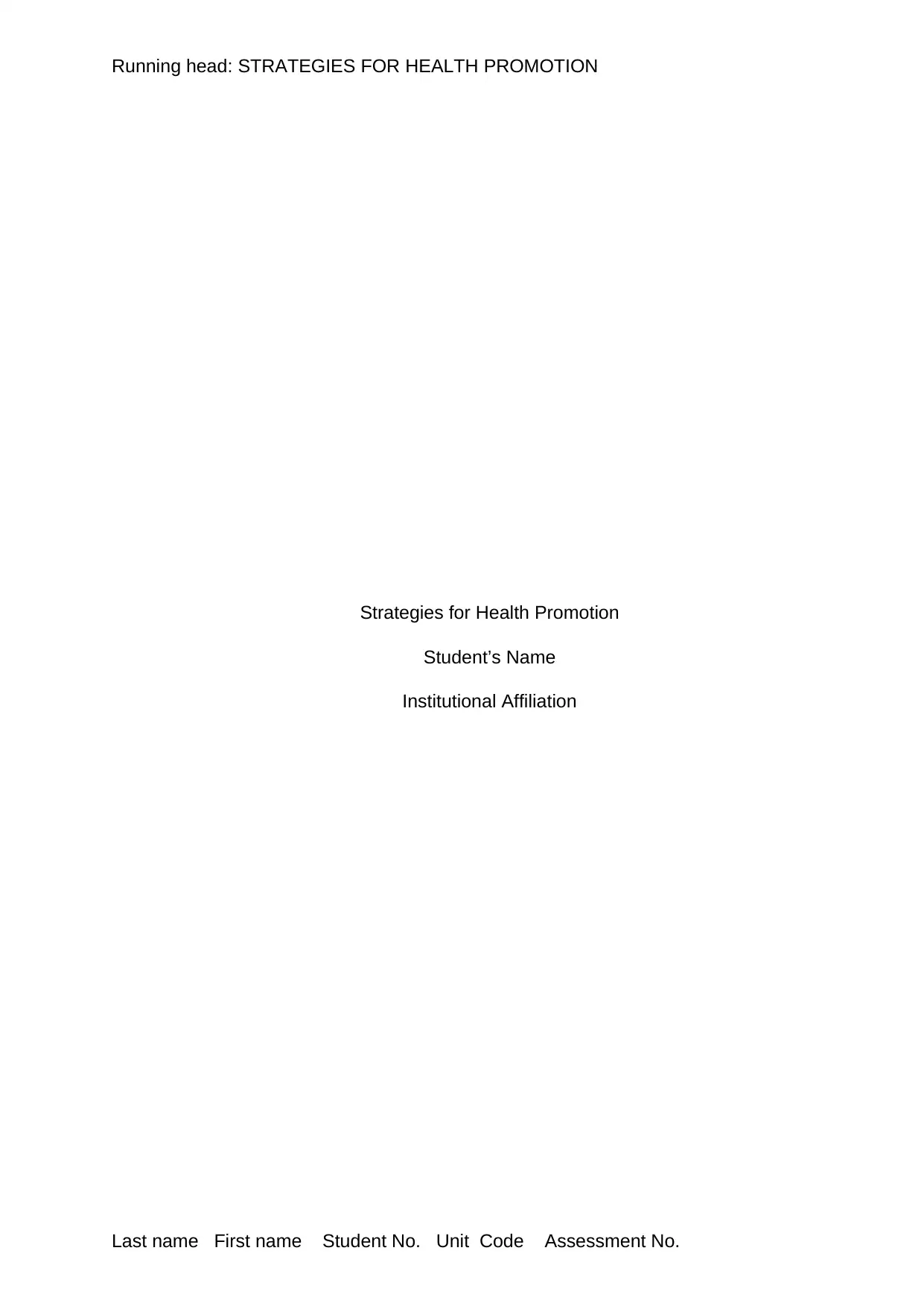
Running head: STRATEGIES FOR HEALTH PROMOTION
Strategies for Health Promotion
Student’s Name
Institutional Affiliation
Last name First name Student No. Unit Code Assessment No.
Strategies for Health Promotion
Student’s Name
Institutional Affiliation
Last name First name Student No. Unit Code Assessment No.
Paraphrase This Document
Need a fresh take? Get an instant paraphrase of this document with our AI Paraphraser
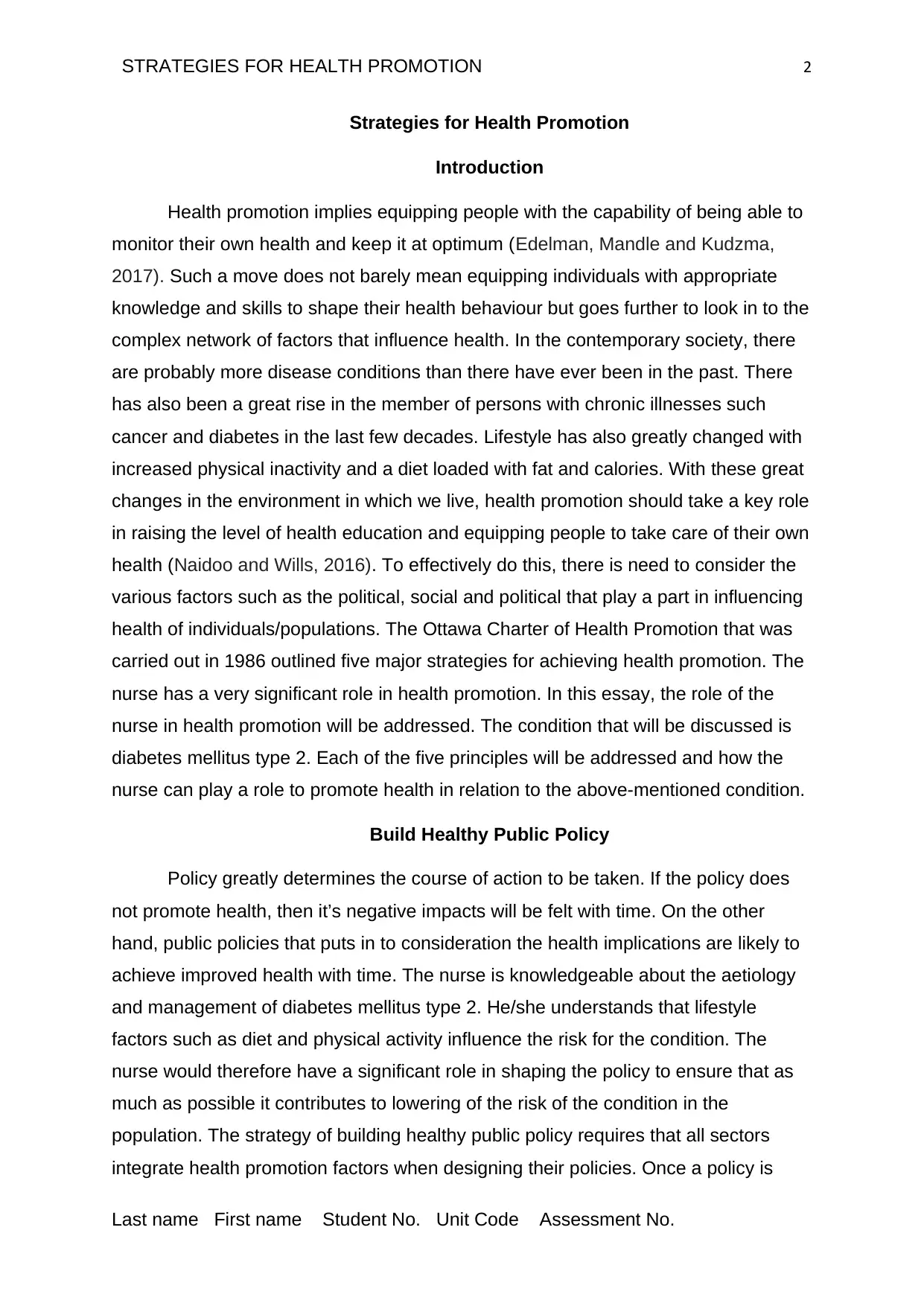
STRATEGIES FOR HEALTH PROMOTION 2
Strategies for Health Promotion
Introduction
Health promotion implies equipping people with the capability of being able to
monitor their own health and keep it at optimum (Edelman, Mandle and Kudzma,
2017). Such a move does not barely mean equipping individuals with appropriate
knowledge and skills to shape their health behaviour but goes further to look in to the
complex network of factors that influence health. In the contemporary society, there
are probably more disease conditions than there have ever been in the past. There
has also been a great rise in the member of persons with chronic illnesses such
cancer and diabetes in the last few decades. Lifestyle has also greatly changed with
increased physical inactivity and a diet loaded with fat and calories. With these great
changes in the environment in which we live, health promotion should take a key role
in raising the level of health education and equipping people to take care of their own
health (Naidoo and Wills, 2016). To effectively do this, there is need to consider the
various factors such as the political, social and political that play a part in influencing
health of individuals/populations. The Ottawa Charter of Health Promotion that was
carried out in 1986 outlined five major strategies for achieving health promotion. The
nurse has a very significant role in health promotion. In this essay, the role of the
nurse in health promotion will be addressed. The condition that will be discussed is
diabetes mellitus type 2. Each of the five principles will be addressed and how the
nurse can play a role to promote health in relation to the above-mentioned condition.
Build Healthy Public Policy
Policy greatly determines the course of action to be taken. If the policy does
not promote health, then it’s negative impacts will be felt with time. On the other
hand, public policies that puts in to consideration the health implications are likely to
achieve improved health with time. The nurse is knowledgeable about the aetiology
and management of diabetes mellitus type 2. He/she understands that lifestyle
factors such as diet and physical activity influence the risk for the condition. The
nurse would therefore have a significant role in shaping the policy to ensure that as
much as possible it contributes to lowering of the risk of the condition in the
population. The strategy of building healthy public policy requires that all sectors
integrate health promotion factors when designing their policies. Once a policy is
Last name First name Student No. Unit Code Assessment No.
Strategies for Health Promotion
Introduction
Health promotion implies equipping people with the capability of being able to
monitor their own health and keep it at optimum (Edelman, Mandle and Kudzma,
2017). Such a move does not barely mean equipping individuals with appropriate
knowledge and skills to shape their health behaviour but goes further to look in to the
complex network of factors that influence health. In the contemporary society, there
are probably more disease conditions than there have ever been in the past. There
has also been a great rise in the member of persons with chronic illnesses such
cancer and diabetes in the last few decades. Lifestyle has also greatly changed with
increased physical inactivity and a diet loaded with fat and calories. With these great
changes in the environment in which we live, health promotion should take a key role
in raising the level of health education and equipping people to take care of their own
health (Naidoo and Wills, 2016). To effectively do this, there is need to consider the
various factors such as the political, social and political that play a part in influencing
health of individuals/populations. The Ottawa Charter of Health Promotion that was
carried out in 1986 outlined five major strategies for achieving health promotion. The
nurse has a very significant role in health promotion. In this essay, the role of the
nurse in health promotion will be addressed. The condition that will be discussed is
diabetes mellitus type 2. Each of the five principles will be addressed and how the
nurse can play a role to promote health in relation to the above-mentioned condition.
Build Healthy Public Policy
Policy greatly determines the course of action to be taken. If the policy does
not promote health, then it’s negative impacts will be felt with time. On the other
hand, public policies that puts in to consideration the health implications are likely to
achieve improved health with time. The nurse is knowledgeable about the aetiology
and management of diabetes mellitus type 2. He/she understands that lifestyle
factors such as diet and physical activity influence the risk for the condition. The
nurse would therefore have a significant role in shaping the policy to ensure that as
much as possible it contributes to lowering of the risk of the condition in the
population. The strategy of building healthy public policy requires that all sectors
integrate health promotion factors when designing their policies. Once a policy is
Last name First name Student No. Unit Code Assessment No.
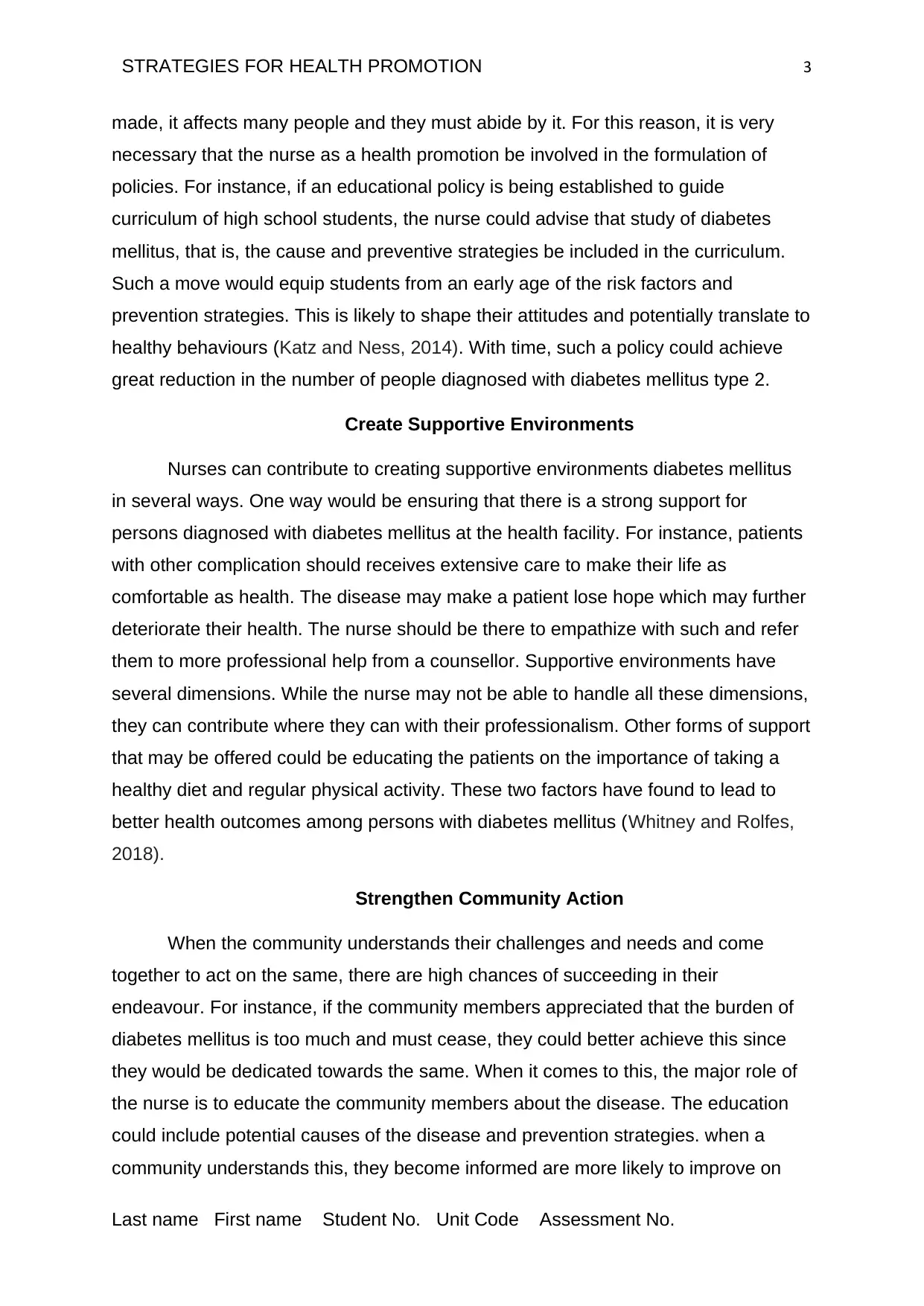
STRATEGIES FOR HEALTH PROMOTION 3
made, it affects many people and they must abide by it. For this reason, it is very
necessary that the nurse as a health promotion be involved in the formulation of
policies. For instance, if an educational policy is being established to guide
curriculum of high school students, the nurse could advise that study of diabetes
mellitus, that is, the cause and preventive strategies be included in the curriculum.
Such a move would equip students from an early age of the risk factors and
prevention strategies. This is likely to shape their attitudes and potentially translate to
healthy behaviours (Katz and Ness, 2014). With time, such a policy could achieve
great reduction in the number of people diagnosed with diabetes mellitus type 2.
Create Supportive Environments
Nurses can contribute to creating supportive environments diabetes mellitus
in several ways. One way would be ensuring that there is a strong support for
persons diagnosed with diabetes mellitus at the health facility. For instance, patients
with other complication should receives extensive care to make their life as
comfortable as health. The disease may make a patient lose hope which may further
deteriorate their health. The nurse should be there to empathize with such and refer
them to more professional help from a counsellor. Supportive environments have
several dimensions. While the nurse may not be able to handle all these dimensions,
they can contribute where they can with their professionalism. Other forms of support
that may be offered could be educating the patients on the importance of taking a
healthy diet and regular physical activity. These two factors have found to lead to
better health outcomes among persons with diabetes mellitus (Whitney and Rolfes,
2018).
Strengthen Community Action
When the community understands their challenges and needs and come
together to act on the same, there are high chances of succeeding in their
endeavour. For instance, if the community members appreciated that the burden of
diabetes mellitus is too much and must cease, they could better achieve this since
they would be dedicated towards the same. When it comes to this, the major role of
the nurse is to educate the community members about the disease. The education
could include potential causes of the disease and prevention strategies. when a
community understands this, they become informed are more likely to improve on
Last name First name Student No. Unit Code Assessment No.
made, it affects many people and they must abide by it. For this reason, it is very
necessary that the nurse as a health promotion be involved in the formulation of
policies. For instance, if an educational policy is being established to guide
curriculum of high school students, the nurse could advise that study of diabetes
mellitus, that is, the cause and preventive strategies be included in the curriculum.
Such a move would equip students from an early age of the risk factors and
prevention strategies. This is likely to shape their attitudes and potentially translate to
healthy behaviours (Katz and Ness, 2014). With time, such a policy could achieve
great reduction in the number of people diagnosed with diabetes mellitus type 2.
Create Supportive Environments
Nurses can contribute to creating supportive environments diabetes mellitus
in several ways. One way would be ensuring that there is a strong support for
persons diagnosed with diabetes mellitus at the health facility. For instance, patients
with other complication should receives extensive care to make their life as
comfortable as health. The disease may make a patient lose hope which may further
deteriorate their health. The nurse should be there to empathize with such and refer
them to more professional help from a counsellor. Supportive environments have
several dimensions. While the nurse may not be able to handle all these dimensions,
they can contribute where they can with their professionalism. Other forms of support
that may be offered could be educating the patients on the importance of taking a
healthy diet and regular physical activity. These two factors have found to lead to
better health outcomes among persons with diabetes mellitus (Whitney and Rolfes,
2018).
Strengthen Community Action
When the community understands their challenges and needs and come
together to act on the same, there are high chances of succeeding in their
endeavour. For instance, if the community members appreciated that the burden of
diabetes mellitus is too much and must cease, they could better achieve this since
they would be dedicated towards the same. When it comes to this, the major role of
the nurse is to educate the community members about the disease. The education
could include potential causes of the disease and prevention strategies. when a
community understands this, they become informed are more likely to improve on
Last name First name Student No. Unit Code Assessment No.
⊘ This is a preview!⊘
Do you want full access?
Subscribe today to unlock all pages.

Trusted by 1+ million students worldwide
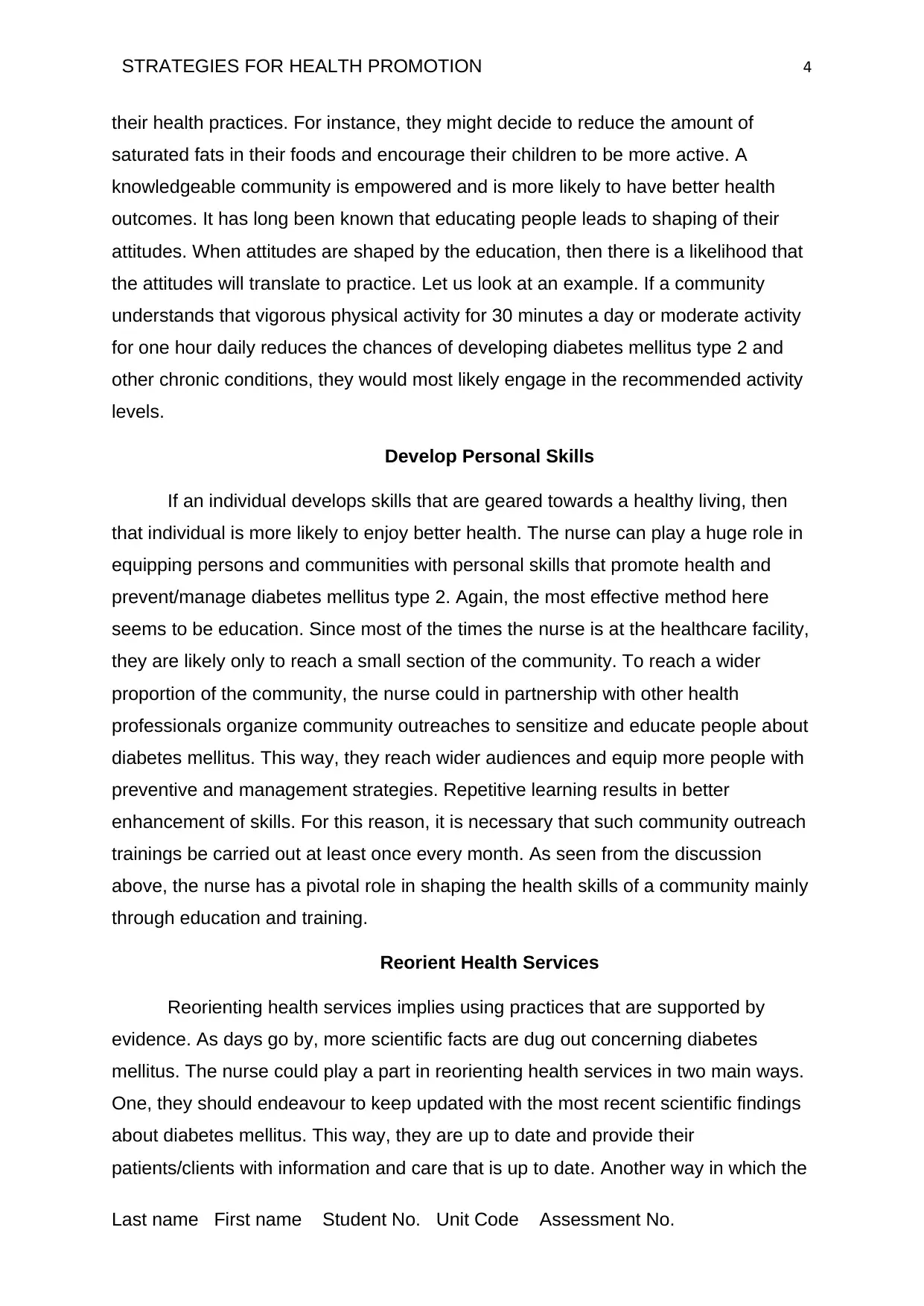
STRATEGIES FOR HEALTH PROMOTION 4
their health practices. For instance, they might decide to reduce the amount of
saturated fats in their foods and encourage their children to be more active. A
knowledgeable community is empowered and is more likely to have better health
outcomes. It has long been known that educating people leads to shaping of their
attitudes. When attitudes are shaped by the education, then there is a likelihood that
the attitudes will translate to practice. Let us look at an example. If a community
understands that vigorous physical activity for 30 minutes a day or moderate activity
for one hour daily reduces the chances of developing diabetes mellitus type 2 and
other chronic conditions, they would most likely engage in the recommended activity
levels.
Develop Personal Skills
If an individual develops skills that are geared towards a healthy living, then
that individual is more likely to enjoy better health. The nurse can play a huge role in
equipping persons and communities with personal skills that promote health and
prevent/manage diabetes mellitus type 2. Again, the most effective method here
seems to be education. Since most of the times the nurse is at the healthcare facility,
they are likely only to reach a small section of the community. To reach a wider
proportion of the community, the nurse could in partnership with other health
professionals organize community outreaches to sensitize and educate people about
diabetes mellitus. This way, they reach wider audiences and equip more people with
preventive and management strategies. Repetitive learning results in better
enhancement of skills. For this reason, it is necessary that such community outreach
trainings be carried out at least once every month. As seen from the discussion
above, the nurse has a pivotal role in shaping the health skills of a community mainly
through education and training.
Reorient Health Services
Reorienting health services implies using practices that are supported by
evidence. As days go by, more scientific facts are dug out concerning diabetes
mellitus. The nurse could play a part in reorienting health services in two main ways.
One, they should endeavour to keep updated with the most recent scientific findings
about diabetes mellitus. This way, they are up to date and provide their
patients/clients with information and care that is up to date. Another way in which the
Last name First name Student No. Unit Code Assessment No.
their health practices. For instance, they might decide to reduce the amount of
saturated fats in their foods and encourage their children to be more active. A
knowledgeable community is empowered and is more likely to have better health
outcomes. It has long been known that educating people leads to shaping of their
attitudes. When attitudes are shaped by the education, then there is a likelihood that
the attitudes will translate to practice. Let us look at an example. If a community
understands that vigorous physical activity for 30 minutes a day or moderate activity
for one hour daily reduces the chances of developing diabetes mellitus type 2 and
other chronic conditions, they would most likely engage in the recommended activity
levels.
Develop Personal Skills
If an individual develops skills that are geared towards a healthy living, then
that individual is more likely to enjoy better health. The nurse can play a huge role in
equipping persons and communities with personal skills that promote health and
prevent/manage diabetes mellitus type 2. Again, the most effective method here
seems to be education. Since most of the times the nurse is at the healthcare facility,
they are likely only to reach a small section of the community. To reach a wider
proportion of the community, the nurse could in partnership with other health
professionals organize community outreaches to sensitize and educate people about
diabetes mellitus. This way, they reach wider audiences and equip more people with
preventive and management strategies. Repetitive learning results in better
enhancement of skills. For this reason, it is necessary that such community outreach
trainings be carried out at least once every month. As seen from the discussion
above, the nurse has a pivotal role in shaping the health skills of a community mainly
through education and training.
Reorient Health Services
Reorienting health services implies using practices that are supported by
evidence. As days go by, more scientific facts are dug out concerning diabetes
mellitus. The nurse could play a part in reorienting health services in two main ways.
One, they should endeavour to keep updated with the most recent scientific findings
about diabetes mellitus. This way, they are up to date and provide their
patients/clients with information and care that is up to date. Another way in which the
Last name First name Student No. Unit Code Assessment No.
Paraphrase This Document
Need a fresh take? Get an instant paraphrase of this document with our AI Paraphraser
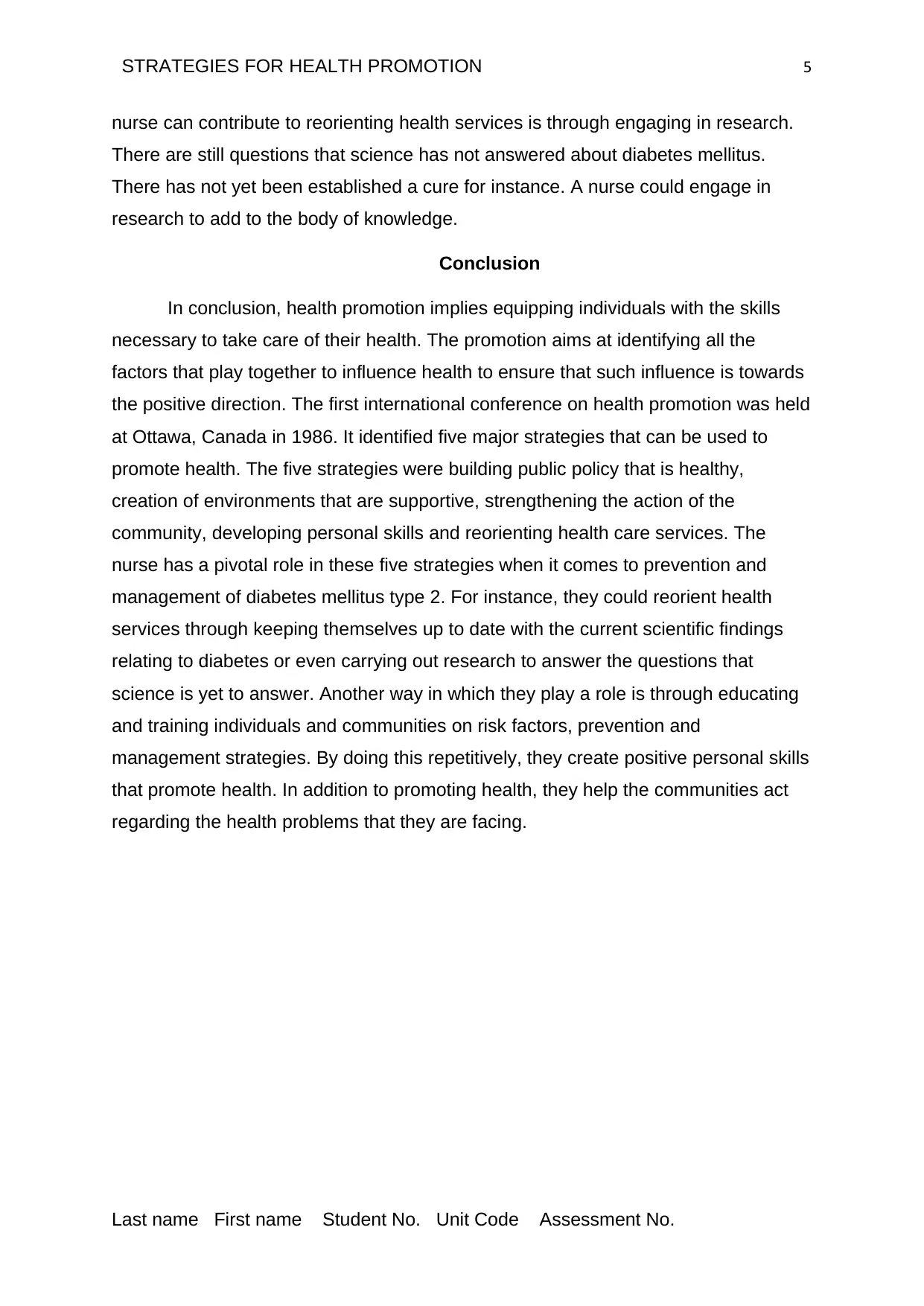
STRATEGIES FOR HEALTH PROMOTION 5
nurse can contribute to reorienting health services is through engaging in research.
There are still questions that science has not answered about diabetes mellitus.
There has not yet been established a cure for instance. A nurse could engage in
research to add to the body of knowledge.
Conclusion
In conclusion, health promotion implies equipping individuals with the skills
necessary to take care of their health. The promotion aims at identifying all the
factors that play together to influence health to ensure that such influence is towards
the positive direction. The first international conference on health promotion was held
at Ottawa, Canada in 1986. It identified five major strategies that can be used to
promote health. The five strategies were building public policy that is healthy,
creation of environments that are supportive, strengthening the action of the
community, developing personal skills and reorienting health care services. The
nurse has a pivotal role in these five strategies when it comes to prevention and
management of diabetes mellitus type 2. For instance, they could reorient health
services through keeping themselves up to date with the current scientific findings
relating to diabetes or even carrying out research to answer the questions that
science is yet to answer. Another way in which they play a role is through educating
and training individuals and communities on risk factors, prevention and
management strategies. By doing this repetitively, they create positive personal skills
that promote health. In addition to promoting health, they help the communities act
regarding the health problems that they are facing.
Last name First name Student No. Unit Code Assessment No.
nurse can contribute to reorienting health services is through engaging in research.
There are still questions that science has not answered about diabetes mellitus.
There has not yet been established a cure for instance. A nurse could engage in
research to add to the body of knowledge.
Conclusion
In conclusion, health promotion implies equipping individuals with the skills
necessary to take care of their health. The promotion aims at identifying all the
factors that play together to influence health to ensure that such influence is towards
the positive direction. The first international conference on health promotion was held
at Ottawa, Canada in 1986. It identified five major strategies that can be used to
promote health. The five strategies were building public policy that is healthy,
creation of environments that are supportive, strengthening the action of the
community, developing personal skills and reorienting health care services. The
nurse has a pivotal role in these five strategies when it comes to prevention and
management of diabetes mellitus type 2. For instance, they could reorient health
services through keeping themselves up to date with the current scientific findings
relating to diabetes or even carrying out research to answer the questions that
science is yet to answer. Another way in which they play a role is through educating
and training individuals and communities on risk factors, prevention and
management strategies. By doing this repetitively, they create positive personal skills
that promote health. In addition to promoting health, they help the communities act
regarding the health problems that they are facing.
Last name First name Student No. Unit Code Assessment No.
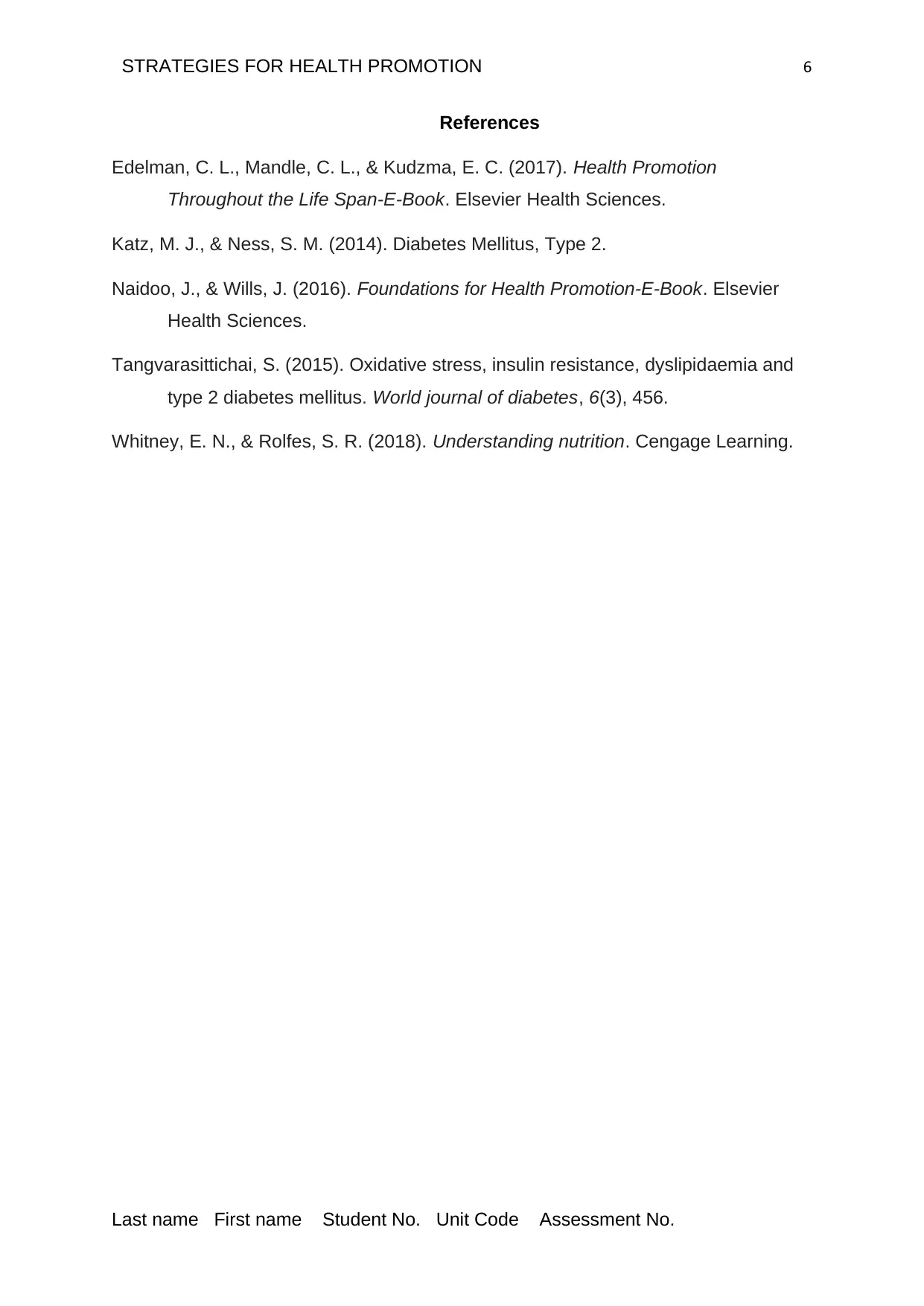
STRATEGIES FOR HEALTH PROMOTION 6
References
Edelman, C. L., Mandle, C. L., & Kudzma, E. C. (2017). Health Promotion
Throughout the Life Span-E-Book. Elsevier Health Sciences.
Katz, M. J., & Ness, S. M. (2014). Diabetes Mellitus, Type 2.
Naidoo, J., & Wills, J. (2016). Foundations for Health Promotion-E-Book. Elsevier
Health Sciences.
Tangvarasittichai, S. (2015). Oxidative stress, insulin resistance, dyslipidaemia and
type 2 diabetes mellitus. World journal of diabetes, 6(3), 456.
Whitney, E. N., & Rolfes, S. R. (2018). Understanding nutrition. Cengage Learning.
Last name First name Student No. Unit Code Assessment No.
References
Edelman, C. L., Mandle, C. L., & Kudzma, E. C. (2017). Health Promotion
Throughout the Life Span-E-Book. Elsevier Health Sciences.
Katz, M. J., & Ness, S. M. (2014). Diabetes Mellitus, Type 2.
Naidoo, J., & Wills, J. (2016). Foundations for Health Promotion-E-Book. Elsevier
Health Sciences.
Tangvarasittichai, S. (2015). Oxidative stress, insulin resistance, dyslipidaemia and
type 2 diabetes mellitus. World journal of diabetes, 6(3), 456.
Whitney, E. N., & Rolfes, S. R. (2018). Understanding nutrition. Cengage Learning.
Last name First name Student No. Unit Code Assessment No.
⊘ This is a preview!⊘
Do you want full access?
Subscribe today to unlock all pages.

Trusted by 1+ million students worldwide
1 out of 6
Related Documents
Your All-in-One AI-Powered Toolkit for Academic Success.
+13062052269
info@desklib.com
Available 24*7 on WhatsApp / Email
![[object Object]](/_next/static/media/star-bottom.7253800d.svg)
Unlock your academic potential
Copyright © 2020–2026 A2Z Services. All Rights Reserved. Developed and managed by ZUCOL.





